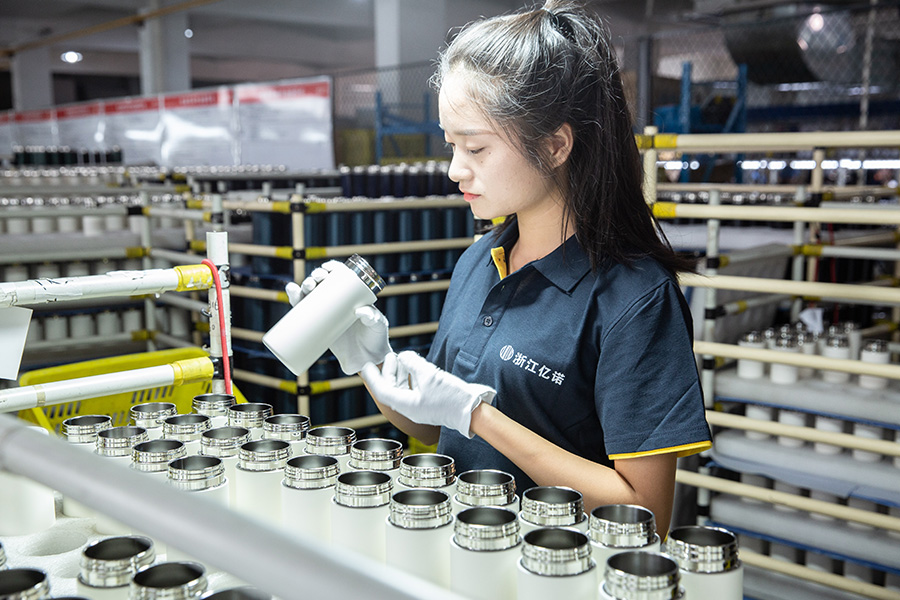At our Vacuum Mug Factory, sustainability is now as important as insulation performance. Globally, stainless steel vacuum mug market demand is rising, with firms exploring low‑carbon production methods, energy‑efficient operations, and responsible materials. Our Stainless Steel Mug Factory follows these trends and invests in green upgrades that resonate with customers focused on environmental responsibility.
1. Sustainability Meets Thermos Production
1.1 Recycled and Low‑Carbon Stainless Steel
More factories now prioritize recycled stainless steel to reduce greenhouse emissions during smelting and raw material processing. Choosing high‑grade recycled steel retains heat retention and corrosion resistance while supporting global eco goals.
1.2 Energy‑Efficient Automation
Integration of robotic welding, automatic stamping, and production monitoring systems reduces energy use and enhances efficiency. Robots run without downtime, ensuring consistent quality and lower power consumption per unit.
We deploy inline production monitoring to track energy, material usage, and detect anomalies in real time—reducing waste and improving yield.

2. Clean Manufacturing from Start to Finish
2.1 Waste Control in the Factory
We employ calibrated measuring devices and automated sensor inspections to minimize scrap and defective parts during welding, forming and inspection steps. Rejected components are recycled or repurposed internally, cutting off-site disposal.
2.2 Reusable Packaging and Eco-Friendly Coatings
Finished mugs are packed in recyclable or reusable cartons. Powder-coated exteriors use low-VOC and lead-free finishes. These choices align with ESG (environmental, social & governance) expectations increasingly influencing buyers in the stainless steel vacuum mug segment.
3. Certifications Validate Sustainable Output
We maintain ISO 14001 for environmental management and integrate it into production planning. Goals include reduced water and power consumption per batch, documented waste recycling rates, and compliance with RoHS/WEEE chemical restrictions for coatings and plastics. These cause auditable reporting for global clients.
4. Why Partners Value Eco‑Focused Manufacturing
Brand alignment: Partners seeking sustainable sourcing appreciate recycled steel content and green production lines.
Lower carbon footprint: Modern automation reduces labor‑intensive steps, saving energy and cutting costs.
Regulatory compliance: Buyers with ESG mandates gain transparency via certifications and process tracking.
Stable quality: Energy‑controlled robots and precision tooling guarantee consistent vacuum insulation performance.
5. Industry Context and Market Trends
The insulated stainless steel mugs market is forecasted to grow at a 15–16 % CAGR over coming years, with stainless steel dominating material share by durability and sustainability preference. Meanwhile, the global drinkware market was worth over USD 35 billion in 2024 and continues rising, driven in part by eco‑sensitive consumers seeking reusable, temperature‑retaining products.
6. Factory Upgrades Supporting Green Goals
6.1 Smart Scheduling and Demand Tracking
By implementing production monitoring systems, our Vacuum Mug Factory tracks energy usage, machine status, and material flows in real time. This improves yield and reduces over‑consumption in metal forming or stamping processes.
6.2 Robotics and less Waste
Automated stamping machines and robotic arms handle forming, sealing, and inspection tasks precisely—cutting scrap and improving repeatability while minimizing worker fatigue and resource inefficiency.
6.3 Custom Green Packaging
ODM/OEM clients can request less-waste packaging designs, recycled cardboard inserts, or bulk packaging options tailored for shipping volume and sustainability goals.
By blending recycled stainless steel, energy‑efficient automation, eco‑safe coatings, and rigorous ISO certifications, our Vacuum Mug Factory is moving from traditional manufacturing toward greener, smarter production.


 中文简体
中文简体 Español
Español






